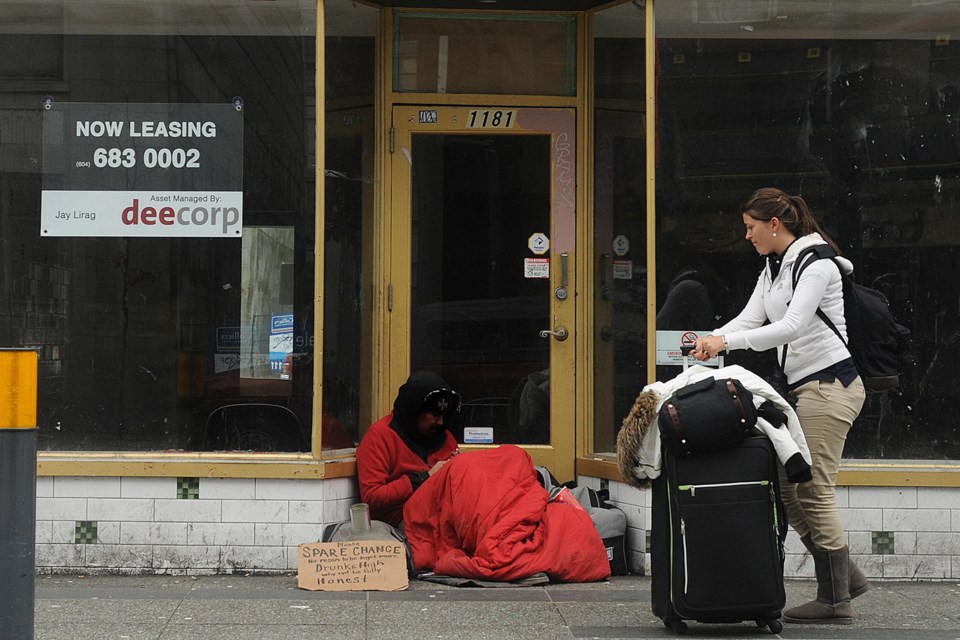If there were three issues that dominated the business of city hall in 2014, they were homelessness, transit and affordable housing.
At the beginning of the year, men and women were living on the street, transit riders were being passed up by buses at the Commercial Drive-Broadway hub and people were desperately searching for housing they could afford.
As 2014 comes to a close, nothing has significantly changed on those fronts.
But some good news may be coming, if you believe Mayor Gregor Robertson and his Vision team of six councillors who were re-elected in November for a third term.
First, the homelessness file.
A one-day count in March recorded 1,803 people either living on the streets (536) or in some form of shelter (1,267), making for the largest homeless population in the city’s history.
Since then, the city opened some temporary housing and B.C. Housing opened more of the social housing buildings it agreed to build on 14 city properties. More are expected to open early in the new year.
In September, the city’s chief housing officer Mukhtar Latif said about 200 of the 536 people on the street had moved into the former Biltmore hotel, the former Ramada on East Hastings and the Kingsway Continental. Some also moved into a new B.C. social housing building on Burrard Street.
Recently, the city also opened the former Kettle of Fish restaurant as a homeless shelter and moved some of the people from the Oppenheimer tent city into the former Quality Inn on Howe Street.
Despite the availability of shelters and housing, Robertson told reporters after his inauguration speech this month that he won’t know whether he’s met his goal of ending street homelessness by 2015 until another count is done in March.
On the transit file, Robertson has probably uttered the words “Broadway” and “subway” more than any others in the past year. Before, during and after his re-election bid, he has talked and talked about the need for a subway to run from the Vancouver Community College-Clark SkyTrain station to Arbutus and out to the University of B.C.
But as NPA mayoral candidate Kirk LaPointe repeatedly pointed out during the election campaign, Robertson has not secured any funding from senior levels of government for the multi-billion dollar project.
Robertson’s response has always included the fact that the majority of the region’s mayors approved a 10-year, $7.5 billion transit and transportation plan in June that includes a $1.9 billion 5.1-kilometre subway line to Arbutus.
The mayors agreed to a referendum question this month to give Metro Vancouver residents an opportunity to vote on whether they will agree to a 0.5 per cent hike to the seven percent provincial sales tax to help pay for the plan.
“I’m very hopeful that if the referendum passes — people of Metro Vancouver speak loud and clear that we want a transit investment – that the provincial and federal governments will respond with the funding that’s needed,” Robertson told reporters after the meeting.
On the affordable housing file, Robertson promised during his re-election campaign that 4,000 units of rental housing will be built by 2018. He also promised to increase the number of two and three bedroom apartments for families and ensure the city’s new “affordable housing agency” will look to use city land to build affordable housing.
Under the city’s former Short Term Incentives for Rental program, or STIR, 19 projects were built for a total of 1,329 market rental units. But the criticism Robertson heard from opposition politicians and certain neighbourhood groups, including the West End Neighbours society, was that rents were too rich for the average renter.
The first project under the STIR program at 1142 Granville St. saw studio apartments go from $960 a month, as quoted in a city staff report, to upwards of $1,400 for a furnished suite.
Under the graduated version of STIR — called Rental 100 — new rules say average rents for initial occupancy cannot exceed the following specified rents by more than 10 per cent:
• $1,443 per month for a studio
• $1,517 per month for a one-bedroom
• $2,061 for a two-bedroom
• $2,743 for a three-bedroom
At his inauguration this month, Robertson said families renting homes in Vancouver deserve a better option than paying “palace-sized rents for a postage-stamp apartment.”
He continued: “Yes, rising prices are a consequence of growth and prosperity. Affordability is a non-stop challenge in a city like ours. But that doesn’t mean we have to allow working and middle-class families to be priced out of town.”
The mayor and his Vision team have ruled city hall for six years and get another four to make gains not only on affordability but also homelessness and transit. With a federal election called for next year, Robertson said you can expect him to push the city’s agenda “onto centre stage.”



